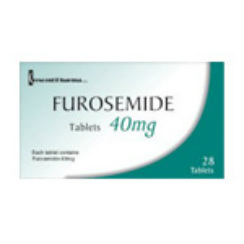Pharmacology definition - Furosemide

Furosemide
Furosemide will be useful in treating patient with hypertension, pulmonary edema, heart failure, renal failure, hepatic failure and hypercalcemia.
Furosemide is a loop diuretics which is part of the derivatives of sulfonamide. Furosemide may block and inhibit Na+/K+/2CI transport system in the thick ascending portion of the loop of Henle of the nephron. The inhibition of the Na+/K+/2CI- may lead to retention of potassium ion , water and sodium ion in the lumen of the tubule which later lead to increase in the loss of electrolytes and water.
Furosemide may induce allergic reaction in patient with allergy to sulfa. In this case ethacrynic acid, a type of diuresis is used as an alternative. Ethacrynic acid is also useful as the patient may not suffer from gout due to hyperuricemia which is related to the intake of furosemide. Gout will develop due to increase reabsorption of urate secondary to increase in proximal Na+ reabsorption. The common side effects of furosemide may include, ototoxicity, hypokalemia, hypovolemia,hypomagnesemia, interstitial nephritis, and allergy reaction .
Furosemide will be useful in treating patient with hypertension, pulmonary edema, heart failure, renal failure, hepatic failure and hypercalcemia.
Furosemide is a loop diuretics which is part of the derivatives of sulfonamide. Furosemide may block and inhibit Na+/K+/2CI transport system in the thick ascending portion of the loop of Henle of the nephron. The inhibition of the Na+/K+/2CI- may lead to retention of potassium ion , water and sodium ion in the lumen of the tubule which later lead to increase in the loss of electrolytes and water.
Furosemide may induce allergic reaction in patient with allergy to sulfa. In this case ethacrynic acid, a type of diuresis is used as an alternative. Ethacrynic acid is also useful as the patient may not suffer from gout due to hyperuricemia which is related to the intake of furosemide. Gout will develop due to increase reabsorption of urate secondary to increase in proximal Na+ reabsorption. The common side effects of furosemide may include, ototoxicity, hypokalemia, hypovolemia,hypomagnesemia, interstitial nephritis, and allergy reaction .
